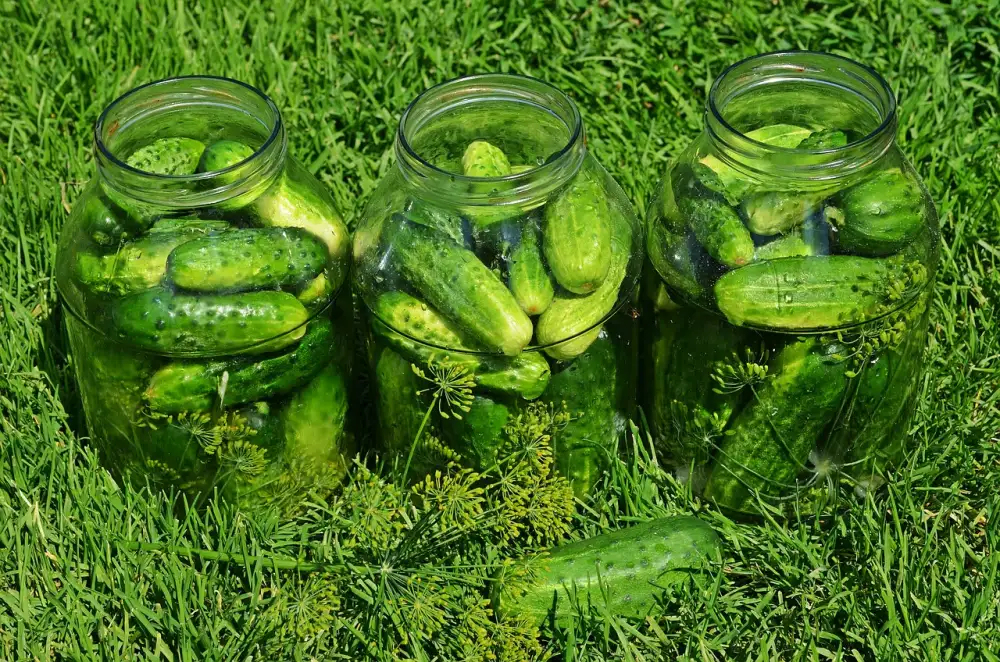Dill Pickles: Unleashing the Tangy Delights of Fermented Cucumbers in Every Bite

Dill pickles, with their tangy and refreshing flavor, are a beloved culinary delight enjoyed by many around the world. These pickles are made from cucumbers that have been soaked in a brine solution infused with dill weed, garlic, and other spices. The result is a crunchy and flavorful pickle that adds a burst of zesty goodness to any dish. Whether enjoyed on their own as a snack or used as a condiment in sandwiches and salads, dill pickles never fail to tantalize the taste buds. Join us on a journey to discover the wonders of dill pickles and unlock the secrets behind their irresistible tang.
History and origin of dill pickles
Dill pickles have a rich history that dates back thousands of years. The origin of dill pickles can be traced to ancient Mesopotamia, where cucumbers were first cultivated. The process of pickling cucumbers in brine was developed as a way to preserve them for long periods of time.
The popularity of dill pickles spread throughout the Mediterranean region and eventually reached Europe during the Middle Ages. It was during this time that dill, a herb with a distinctive flavor, was added to the pickling process, giving rise to the name "dill pickle."
In the 17th century, dill pickles made their way to North America with European immigrants. They quickly became a staple in American cuisine, particularly in Jewish delicatessens where they were served alongside sandwiches and other dishes.
Today, dill pickles are enjoyed worldwide and have become an iconic part of many culinary traditions. Their tangy flavor and crunchy texture make them a beloved snack and condiment in various cuisines around the globe.
The process of making dill pickles
The process of making dill pickles is a fascinating combination of science and art. It starts with selecting fresh cucumbers, preferably small and firm. These cucumbers are then washed thoroughly to remove any dirt or impurities. Next, they are soaked in a brine solution made from water, vinegar, salt, and spices like dill seeds, garlic, and peppercorns. The cucumbers are left to ferment in this brine for several days or even weeks, allowing the natural bacteria on the cucumbers to convert the sugars into lactic acid. This fermentation process gives dill pickles their distinctive tangy flavor and crisp texture. Once the desired level of fermentation is achieved, the pickles are packed into jars and stored in a cool place to further develop their flavors. The longer they sit, the more intense their flavor becomes. Making dill pickles at home can be a fun and rewarding experience, but it requires patience and attention to detail. However, for those who prefer convenience, there are also commercially produced dill pickles available in supermarkets that offer the same tangy delights without the hassle of making them from scratch.
Health benefits of dill pickles
Dill pickles not only tantalize our taste buds, but they also offer a range of health benefits. These tangy treats are low in calories and fat, making them a guilt-free snack option. Additionally, dill pickles are packed with vitamins and minerals such as vitamin K, which is essential for healthy bone development. They also contain antioxidants that help fight inflammation and boost the immune system. The fermentation process involved in making dill pickles promotes the growth of beneficial bacteria in our gut, aiding digestion and improving overall gut health. So next time you reach for a dill pickle, know that you're not just satisfying your cravings but also nourishing your body.
Culinary uses and recipes with dill pickles
Culinary Uses and Recipes with Dill Pickles:
Dill pickles are not just a sidekick to your sandwich; they can be the star ingredient in many dishes. Their tangy flavor adds a delightful twist to various recipes. Add chopped dill pickles to potato salad for a zesty kick, or mix them into deviled eggs for an extra burst of flavor. For a unique twist on classic burgers, top them with sliced dill pickles and melted cheese. You can even use dill pickle juice as a marinade for chicken or pork to infuse it with a tangy taste. With dill pickles, the culinary possibilities are endless!
Popular variations and flavors of dill pickles
While traditional dill pickles are made with cucumbers, there are various other vegetables that can be pickled using the same dill pickle brine. Some popular variations include pickled green beans, carrots, radishes, and even watermelon rinds. These unique pickles offer a delightful twist to the classic dill pickle flavor.
In addition to different vegetables, there are also a variety of flavors that can be added to dill pickles. Garlic lovers can enjoy garlic dill pickles, where cloves of garlic are added to the brine for an extra kick of flavor. For those who prefer a spicy kick, jalapeno peppers or red pepper flakes can be added to create spicy dill pickles.
Other popular flavor variations include sweet and sour dill pickles, where sugar and vinegar are added to balance out the tanginess of the brine. Mustard seeds or horseradish can also be added for a tangy and zesty flavor profile.
With so many variations and flavors available, there is a dill pickle option to suit every palate. Whether you prefer traditional cucumber dills or want to explore new vegetable combinations and flavors, the world of dill pickles is full of exciting possibilities.
Tips for selecting and storing dill pickles
When it comes to selecting dill pickles, there are a few things to keep in mind. Firstly, look for pickles that have a vibrant green color and firm texture. Avoid any that appear dull or mushy. Additionally, check the label for ingredients and opt for pickles that are made with natural ingredients and minimal preservatives.
When it comes to storing dill pickles, it's important to keep them refrigerated at all times. This helps maintain their crispness and flavor. Once opened, transfer the pickles along with their brine into an airtight container and store them in the refrigerator. This will ensure they stay fresh for longer.
Remember that dill pickles have a relatively long shelf life, but their quality may deteriorate over time. So, it's best to consume them within a few months of purchase for the ultimate tangy delight in every bite!
In conclusion, the irresistible tang of dill pickles is a culinary delight that cannot be ignored. Whether enjoyed on their own or used as a flavorful ingredient in various dishes, dill pickles add a burst of tanginess and crunch that enhances any meal. The process of fermenting cucumbers with dill and other spices creates a unique flavor profile that is loved by many. With their long history and numerous health benefits, dill pickles have become a staple in kitchens around the world. So next time you're looking to add some zing to your plate, don't forget to reach for a jar of dill pickles and savor the tangy delights they bring to every bite.
Published: 04. 12. 2023
Category: Food



